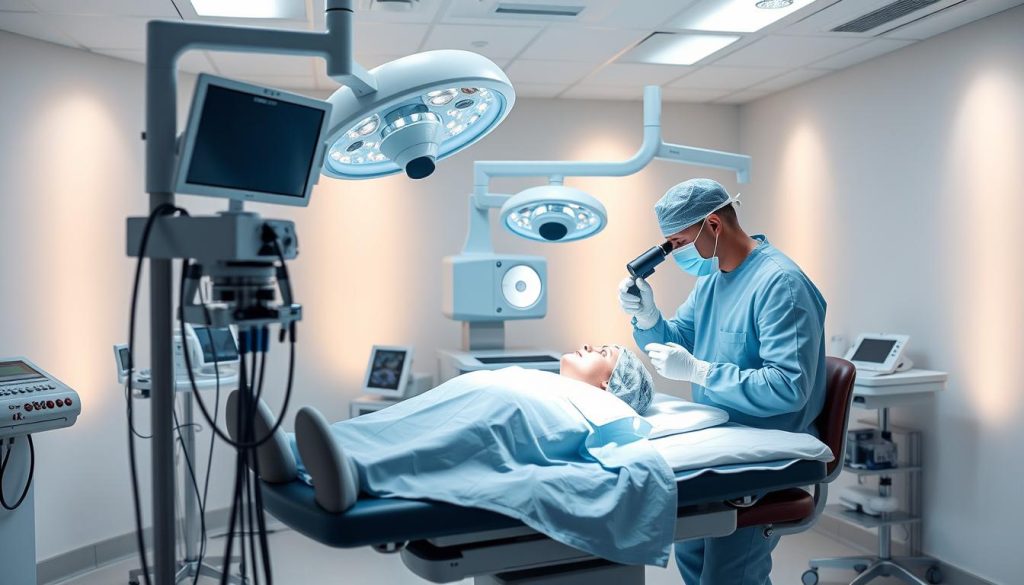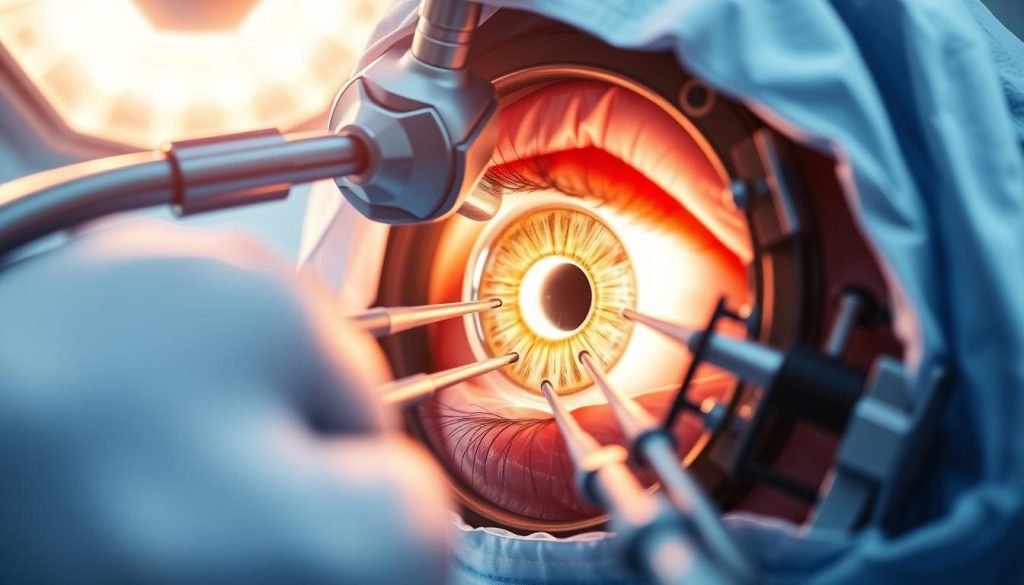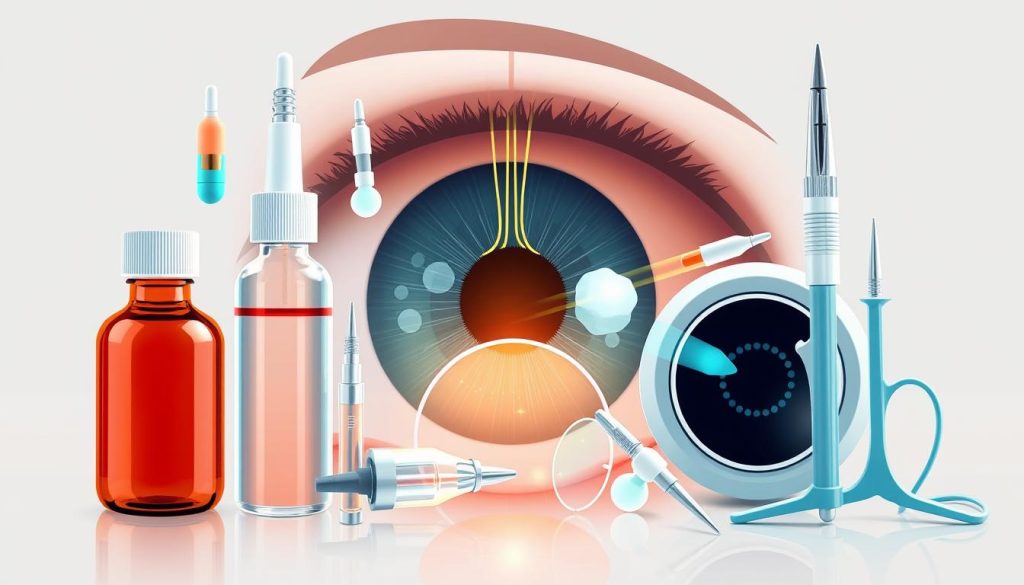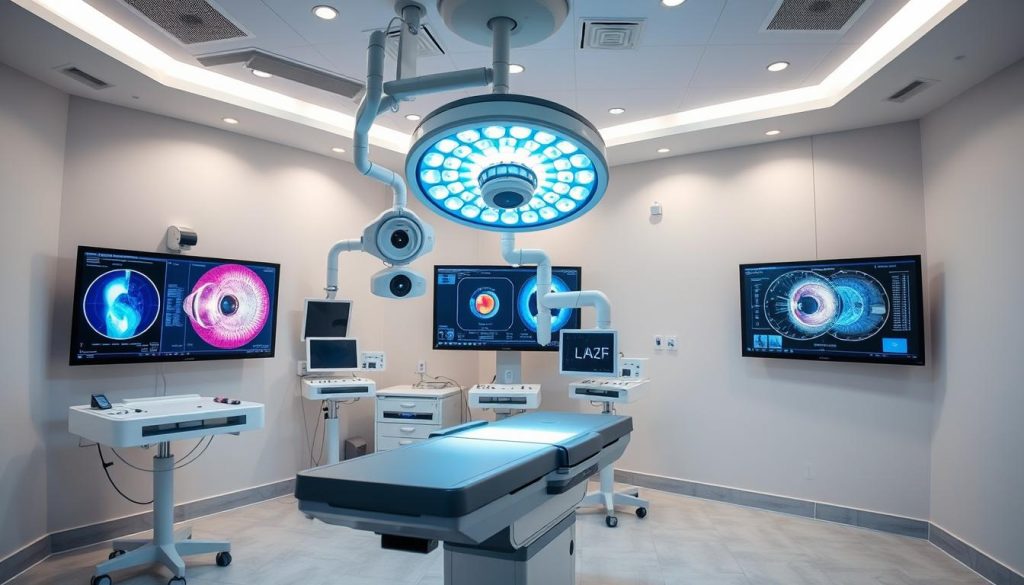Ophthalmology has made great strides in recent years. Now, there are many ways to correct vision problems. Options range from glasses and contact lenses to advanced surgical procedures.
Eye and surgery treatments are becoming more popular with better technology. These treatments can fix nearsightedness, farsightedness, and astigmatism. Many people find that surgery greatly improves their life quality.
We will explore both surgical and non-surgical vision correction methods. Knowing about these options can help you make better choices for your eye health and vision.
Understanding Common Vision Problems and Their Impact
Vision problems affect millions of people worldwide. They impact daily life and work. Eye and surgery solutions offer hope for vision correction. Let’s explore common vision issues and their effects.
Refractive Errors: Myopia, Hyperopia, and Astigmatism
Refractive errors are the most frequent vision problems. Myopia (nearsightedness) makes distant objects appear blurry. Hyperopia (farsightedness) causes difficulty focusing on close objects. Astigmatism results in distorted vision at all distances.
Age-Related Vision Deterioration
As we age, our eyes undergo changes that can affect vision. Presbyopia, a condition that typically starts around age 40, makes it challenging to focus on close-up objects. Cataracts, another age-related issue, cause clouding of the eye’s natural lens.
Impact on Daily Life and Professional Activities
Vision problems can significantly affect one’s quality of life. Reading, driving, and using digital devices become difficult. In the workplace, poor vision can lead to reduced productivity and increased eye strain.
| Vision Problem | Daily Life Impact | Professional Impact |
|---|---|---|
| Myopia | Difficulty seeing road signs while driving | Struggles with presentations or whiteboard work |
| Hyperopia | Trouble reading books or smartphone screens | Eye strain when working on computers |
| Astigmatism | Blurred vision at all distances | Difficulty with detail-oriented tasks |
Understanding these vision problems is key for seeking the right treatments. Vision correction options can greatly improve life and work performance for those affected by these common eye issues.
Modern Eye and Surgery Techniques: An Overview
Eye surgery has made huge strides in recent years. Ophthalmology now offers many advanced procedures to fix vision issues. These new methods make treatments safer and more effective than before.
Laser-based surgeries are at the forefront of modern vision correction. LASIK, for instance, uses lasers to reshape the cornea. This quick surgery can correct nearsightedness, farsightedness, and astigmatism.
Older surgical methods are also important in ophthalmology. Cataract surgery, which replaces cloudy lenses with artificial ones, is very common. Newer techniques allow for smaller incisions and faster healing.
Glaucoma treatments have also seen big improvements. Minimally invasive glaucoma surgery (MIGS) is a safer option compared to traditional methods. These surgeries can lower eye pressure with less risk and quicker recovery times.
| Procedure | Purpose | Recovery Time |
|---|---|---|
| LASIK | Vision correction | 1-2 days |
| Cataract Surgery | Lens replacement | 1-2 weeks |
| MIGS | Glaucoma treatment | 2-4 weeks |
Technology keeps advancing in eye and surgery. From 3D surgical planning to robot-assisted procedures, these innovations promise better results for patients looking for vision correction.
LASIK Surgery: Advanced Vision Correction Method
LASIK has changed how we correct vision, making it safe and effective for many. It reshapes the cornea, helping light focus on the retina. This improves how well we see.

Candidacy Requirements for LASIK
Not everyone can get LASIK. The right candidates are:
- At least 18 years old
- Have stable vision for at least a year
- Have enough corneal thickness
- Free from certain eye diseases
- Have realistic hopes for the outcome
The LASIK Procedure Step by Step
The LASIK surgery is quick and almost painless. It makes a thin flap in the cornea, reshapes the tissue, and then moves the flap back. It usually takes less than 30 minutes for both eyes.
Recovery and Expected Results
Most people see better within 24 hours of LASIK. It takes a few days to weeks to fully recover. Many patients get 20/20 vision or better, needing glasses or contacts less.
“LASIK changed my life. I can see clearly without glasses for the first time in years!” – Sarah, LASIK patient
While LASIK works well for many, it’s important to talk to an experienced eye surgeon. They can help decide if LASIK is right for you.
Cataract Surgery: Restoring Clear Vision

Cataracts make the eye’s lens cloudy, causing blurry vision. This surgery removes the cloudy lens and replaces it with an artificial one. It has greatly improved the lives of millions globally.
The cloudy lens is taken out and a new one is put in during surgery. Modern methods like phacoemulsification use sound waves to break up the cataract. This makes the surgery easier and recovery quicker.
Laser-assisted cataract surgery is a new approach. It uses a laser to make precise cuts and soften the cataract. This method can lead to better results.
“Cataract surgery is one of the most successful and life-changing procedures in medicine today.”
Patients can choose from different types of lenses for their surgery. These include:
- Monofocal lenses for clear distance vision
- Multifocal lenses for both near and far vision
- Toric lenses to correct astigmatism
Recovery from cataract surgery is usually fast. Most people see better within days. It takes a few weeks to fully recover. This surgery can greatly improve your life, letting you enjoy activities again.
| Aspect | Traditional Cataract Surgery | Laser-Assisted Cataract Surgery |
|---|---|---|
| Incision Creation | Manual with blade | Laser-guided |
| Cataract Removal | Ultrasound (Phacoemulsification) | Laser softening + Phacoemulsification |
| Precision | High | Very High |
| Recovery Time | 1-2 weeks | 1-2 weeks |
Glaucoma Treatment Options and Surgical Interventions
Glaucoma treatment aims to stop vision loss by controlling eye pressure. Eye doctors use different methods to fight this condition. Let’s look at the main ways to treat glaucoma.
Medical Management of Glaucoma
Eye drops are often the first choice for glaucoma treatment. They help lower eye pressure by reducing fluid or improving drainage. Sometimes, oral meds are added to make eye drops work better.

Laser Treatment Options
When eye drops aren’t enough, laser surgery is a good option. It’s less invasive. Two common laser treatments are:
- Selective Laser Trabeculoplasty (SLT)
- Argon Laser Trabeculoplasty (ALT)
These lasers help improve fluid drainage, lowering eye pressure.
Traditional Glaucoma Surgery
In severe cases or when other treatments don’t work, surgery is needed. These surgeries create new drainage paths or use tiny tubes for fluid to leave the eye.
| Surgery Type | Description | Recovery Time |
|---|---|---|
| Trabeculectomy | Creates a new drainage channel | 4-6 weeks |
| Drainage Implant | Inserts a tiny tube for fluid outflow | 6-8 weeks |
Your eye surgeon will choose the best treatment for you. They consider your glaucoma type, how severe it is, and your health. Regular check-ups are key to track progress and adjust treatment if needed.
Corneal Transplantation Procedures
Corneal transplants are key ophthalmology procedures. They help patients with badly damaged corneas see again. These surgeries swap out the damaged tissue with healthy donor tissue, giving hope to those who’ve lost their vision.
Ophthalmologists do two main types of corneal transplants. Full-thickness transplants, or penetrating keratoplasty, replace the whole cornea. Partial-thickness procedures, or lamellar keratoplasty, just replace certain layers.
When do you need a corneal transplant? It’s for:
- Keratoconus
- Fuchs’ dystrophy
- Corneal scarring
- Corneal ulcers
During surgery, the ophthalmologist takes out the damaged tissue. Then, they put in the donor tissue. The new cornea is held in place with tiny sutures. Recovery takes a few months, with vision getting better slowly.
A newer method, Descemet’s Membrane Endothelial Keratoplasty (DMEK), has faster recovery and less chance of rejection. It only replaces the innermost layer of the cornea, keeping more of the patient’s own tissue.
Corneal transplants work well, with many patients seeing a big improvement. It’s important to see an ophthalmologist regularly after surgery. This helps track healing and manage any issues that might come up.
Retinal Detachment: Emergency Surgical Solutions
Retinal detachment is a serious eye condition that needs immediate medical help. When the retina separates, vision loss can happen fast. It’s key to catch it early and fix it quickly to save your sight.
Symptoms and Diagnosis
It’s important to know the signs of retinal detachment. Common symptoms include:
- Sudden flashes of light
- Floaters or “cobwebs” in vision
- A curtain-like shadow over the visual field
- Sudden vision loss
Eye doctors use special tools to check the retina and confirm a detachment.
Surgical Repair Techniques
There are several ways to fix retinal detachment:
| Technique | Description | Recovery Time |
|---|---|---|
| Pneumatic Retinopexy | Injection of gas bubble to reposition retina | 1-2 weeks |
| Scleral Buckle | Silicone band placed around eye to support retina | 2-4 weeks |
| Vitrectomy | Removal of vitreous gel and retina reattachment | 4-6 weeks |
Post-Surgery Care and Recovery
After surgery, patients must follow strict care instructions. This includes keeping their head in a certain position, avoiding hard activities, and using eye drops as directed. Regular check-ups are also key to track healing and avoid problems.
“Timely intervention in retinal detachment cases can make the difference between saving and losing vision.”
With the right care and surgery, many people get back a lot of their vision. The recovery path may take weeks, but the results are often good if treated quickly.
Oculoplastic Surgery: Functional and Aesthetic Benefits
Oculoplastic surgery combines medical needs with beauty. It deals with the eyes and nearby areas. Oculoplastic procedures fix many issues, like droopy eyelids and orbital injuries.
Blepharoplasty, or eyelid surgery, is very common. It fixes vision by removing extra skin. It also makes the eye area look younger. People say they feel more awake and youthful after it.
Ptosis repair is another key treatment. It fixes eyelids that droop too much. This can hurt vision and make you look tired. By lifting the eyelid, it improves both how you see and how you look.
Orbital reconstruction is more complex. It’s needed after injuries or birth defects. This surgery fixes eye alignment and function. It also makes the face look more balanced.
“Oculoplastic surgery can dramatically improve a patient’s quality of life, both visually and cosmetically.”
Oculoplastic surgery also fixes tear duct problems. These surgeries stop chronic tearing or infections. They make eyes healthier and more comfortable. Oculoplastic surgery does more than just look good. It greatly improves daily life and boosts confidence.
PRK and Alternative Laser Vision Correction Methods
Ophthalmology has many ways to fix vision problems, not just LASIK. Photorefractive Keratectomy (PRK) is a top choice. It uses laser surgery to change the shape of the cornea. This makes it great for those who want to see better without glasses or contacts.
Comparing PRK with LASIK
PRK and LASIK both aim to fix vision issues. But they do it in different ways. PRK takes off the top layer of the cornea before using the laser. LASIK, on the other hand, makes a flap in the cornea.
This difference affects how long it takes to heal and who can get the surgery.
| Aspect | PRK | LASIK |
|---|---|---|
| Procedure | Removes outer corneal layer | Creates corneal flap |
| Recovery Time | 1-2 weeks | 24-48 hours |
| Corneal Thickness Required | Less | More |
| Ideal for | Thin corneas, active lifestyles | Most refractive errors |
Recovery Timeline and Expectations
PRK takes longer to heal than LASIK. People often see blurry for a week. Vision gets clearer over weeks to months.
Most people see 20/20 or better in three months. It’s important to take good care of your eyes during this time. This helps avoid problems and gets the best results.
PRK is a safe and effective way to fix vision, good for those who can’t have LASIK. Talk to an eye doctor to find out the best option for your eyes.
Innovative Technologies in Eye Surgery
The field of ophthalmology is seeing a big change. New technologies are changing eye and surgery procedures. This means better results and quicker healing for patients.
Femtosecond lasers are changing corneal surgeries. These fast lasers make very precise cuts. This makes LASIK and other surgeries more accurate.
Wavefront-guided treatments are also a big step forward. They map the eye’s unique problems. This lets surgeons correct vision with great precision.
Intraoperative aberrometry is another big change. It measures the eye’s focusing power during surgery. This allows for adjustments to get the best results, like in cataract surgery.
Artificial intelligence is also making a big impact. AI can look at retinal images to find diseases like diabetic retinopathy. This helps doctors catch problems early, leading to better treatment.
Robotic-assisted eye surgery is coming soon. These systems will make surgeries more precise and stable. They could help more surgeons do complex procedures.
As these technologies get better, the future of eye and surgery looks bright. Patients can expect safer surgeries, quicker healing, and better vision.
Choosing the Right Eye Surgeon and Facility
Finding the right eye surgeon and facility is key for good eye surgery results. This choice affects your vision and eye health a lot. Let’s look at important things to think about when making this big decision.
Credentials and Experience
Find an eye surgeon with the right credentials and lots of experience in eye surgery. Board certification is essential, showing they meet high standards. Also, ask about their experience with your surgery.
| Qualification | Importance |
|---|---|
| Board Certification | Ensures surgeon meets high standards |
| Years of Experience | Indicates proficiency in eye surgery |
| Specialization | Expertise in specific eye procedures |
Facility Accreditation
Choose a surgical facility that’s accredited for your eye surgery. Accreditation means the facility follows strict safety and quality rules. This can make you feel safer and lower the chance of problems during and after your surgery.
Patient Reviews and Success Rates
Look at patient testimonials and success rates to understand the surgeon’s performance. While these are important, they shouldn’t be the only thing you look at. Every case is different, and results can vary.
“I felt confident in my surgeon’s abilities after reviewing their impressive success rates and reading positive patient reviews. It made a big difference in my decision-making process.”
By thinking about these points, you can make a smart choice about your eye surgeon and facility. This sets you up for a successful surgery and better vision.
Cost Considerations and Insurance Coverage
Eye and surgery costs vary a lot. LASIK, for example, can cost between $1,500 and $3,000 per eye. Cataract surgery is about $3,500 per eye. These prices show the high tech and skill needed.
Insurance for eye surgeries depends on if it’s needed. Most plans cover things like cataract removal. But, elective surgeries like LASIK are usually not covered, so you have to pay yourself.
There are ways to make costs more manageable. You can use FSAs or HSAs to pay with pre-tax dollars. Some jobs even offer vision plans that help with the cost.
| Procedure | Average Cost | Typical Insurance Coverage |
|---|---|---|
| LASIK | $2,250 per eye | Not usually covered |
| Cataract Surgery | $3,500 per eye | Often covered |
| Glaucoma Surgery | $5,000 – $7,000 | Usually covered |
When thinking about eye surgery, talk to your surgeon and insurance. Knowing your options can help you decide what’s best for your vision.
Recovery and Post-Operative Care Guidelines
After eye surgery, taking good care is key for healing and better vision. Ophthalmology experts stress the need to follow post-operative instructions for the best results.
Immediate Post-Surgery Care
Right after surgery, wear protective eye shields and don’t touch or rub your eyes. Use eye drops as directed to prevent infection and aid healing. Avoid water and physical activities for a few days.
Long-term Vision Maintenance
To keep your vision sharp, go to all follow-up appointments with your eye surgeon. Wear sunglasses outside to protect your eyes from UV rays. Start normal activities again as your ophthalmologist advises for a smooth recovery.
Warning Signs and When to Seek Help
Watch for signs of complications after eye surgery. Look out for severe pain, sudden vision loss, or more redness. If you notice these, call the eye clinic right away. Regular check-ups help catch and fix any problems early, ensuring the best surgery outcome.
“Proper post-operative care is as important as the surgery itself for achieving optimal vision results.”
Latest Advancements in Vision Correction Technology
The field of ophthalmology is growing fast. Gene therapy is showing promise in treating inherited retinal diseases. This new method targets specific genetic mutations, giving hope to those with rare eye disorders.
Stem cell therapies are also making a big impact. Scientists are using these cells to repair damaged retinal tissue. This could help people with macular degeneration regain their sight.
There are also new tools for diagnosing eye problems. OCT angiography lets doctors see the eye’s blood vessels in great detail. Adaptive optics imaging gives clear views of individual cells in the retina. This helps doctors understand eye health better.
These new technologies are changing eye care for the better. As technology keeps improving, doctors can handle complex eye conditions more effectively. This means better outcomes and a better quality of life for patients.
FAQ
Q: What are the most common vision problems that may require surgery?
A: Common vision problems needing surgery include myopia, hyperopia, and astigmatism. Cataracts, glaucoma, retinal detachment, and corneal diseases are also common. Age-related presbyopia may also need surgery.
Q: How do I know if I’m a good candidate for LASIK surgery?
A: Good LASIK candidates have stable vision and are at least 18. They should have a moderate refractive error and healthy eyes. An eye exam by an ophthalmologist can confirm if you’re a good fit.
Q: What is the success rate of cataract surgery?
A: Cataract surgery is very successful, with about 98% of patients seeing better without serious issues.
Q: How long does it take to recover from glaucoma surgery?
A: Glaucoma surgery recovery time varies. It usually takes 3-6 weeks to heal initially. Full recovery can take months. Patients must use eye drops and attend follow-ups.
Q: What are the risks associated with corneal transplantation?
A: Corneal transplantation risks include rejection, infection, and glaucoma. Astigmatism and bleeding are also possible. Success rates are high, but following care instructions is key to minimize risks.
Q: How urgent is the treatment for retinal detachment?
A: Retinal detachment is an emergency. Seek treatment immediately for symptoms like flashes, floaters, or vision shadows. Quick surgery is vital to avoid vision loss.
Q: Can oculoplastic surgery improve both vision and appearance?
A: Yes, oculoplastic surgery can enhance both vision and looks. Procedures like blepharoplasty fix vision issues and improve eye appearance.
Q: What’s the difference between PRK and LASIK?
A: PRK and LASIK are laser correction methods. LASIK creates a flap, while PRK removes the cornea’s outer layer. PRK has a longer recovery but may be safer for some.
Q: How do I choose the right eye surgeon?
A: Choose an eye surgeon based on their credentials, experience, and board certifications. Look for specialization in your procedure. Check patient reviews and ensure the facility is accredited.
Q: Are eye surgeries typically covered by insurance?
A: Insurance for eye surgeries varies. Necessary procedures like cataract surgery are often covered. But LASIK, being elective, usually isn’t. Check with your provider and discuss financing with your eye care facility.
Q: What advancements in eye surgery technology should I be aware of?
A: New technologies include femtosecond lasers and wavefront-guided treatments. Intraoperative aberrometry and AI diagnostics are also emerging. These advancements are changing ophthalmology.
Q: How long does the average eye surgery procedure take?
A: Eye surgery times vary. LASIK takes 15-30 minutes per eye. Cataract surgery is 20-30 minutes per eye. Corneal transplants can take 1-2 hours.
Q: What should I expect during the recovery period after eye surgery?
A: Recovery times differ by procedure. You’ll use eye drops, avoid rubbing your eyes, and wear protective eyewear. Most see improvement within days or weeks. Full healing may take months. Always follow your surgeon’s instructions.


















